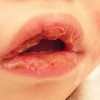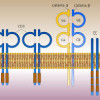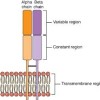Effects of HIV-1 peptides on T-cell receptor variable beta chain families
Abstract
Superantigens (SAGs) selectively stimulate expansion and then deletion of specific T cell antigen receptor (TCR) variable beta chain (Vbeta) families. We investigated six synthetically produced HIV-1-related peptides for evidence of SAG activity: three derived all or in part from the transmembrane gp41 protein and three from the genetic sequence of the tRNA binding region.… Read more





